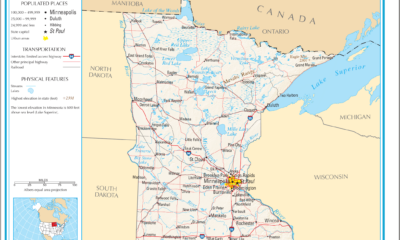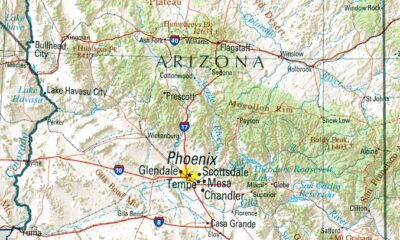Executive
How Trump Rewired the Rust Belt Voter
Donald Trump will carry the Rust Belt by addressing everyday, kitchen-table concerns Democrats are now ignoring.

In the shadow of Pittsburgh’s downtown, where tech startups, nonprofits, “eds-and-meds” institutions, and homeless encampments have replaced the shuttered steel mills, a quiet revolution is brewing. It’s not happening in the trendy coffee shops of the ersatz Williamsburg that is Lawrenceville or the sleek co-working spaces of East Liberty. Instead, this upheaval is taking place in the McMansions of Cranberry Township, the union halls of Washington County, and the fracking fields of Greene County.
Trump captured the working-class base the Democrats threw away
The revolution in question? A wholesale rejection of University of Chicago historian and The Baffler co-founder Thomas Frank’s What’s the Matter with Kansas? thesis by the very white working-class voters it sought to explain. Frank’s 2004 bestseller argued that these voters were being hoodwinked into supporting Republicans through cynical culture war tactics, even as GOP economic policies worked against their interests. But nearly two decades later, Frank’s thesis is colliding head-on with the realities of southwestern Pennsylvania’s political landscape.
The story of how Democrats lost their working-class base began well before Trump. Fifty years ago, Richard Nixon made inroads with blue-collar workers by aligning them against the counterculture Left and public-school integration. But it was the 2000 election that marked a tipping in this realignment. That year, Al Gore’s last-minute pivot to populist rhetoric barely kept him competitive against George W. Bush, who finally and decisively captured several formerly Democratic strongholds in the South and border states.
This shift has only accelerated in recent years. Voting data tells a stark story. In 2000, Democrats carried Allegheny County, plus the seven surrounding counties, by nearly 86,000 votes. By 2020, this same region swung to Republicans by 38,000 votes – a staggering 124,000 vote shift in a state all but certain to be decided by razor-thin margins. This wasn’t a fluke or an anomaly; it was the culmination of a long-term trend that has seen traditionally Democratic strongholds like Washington County become reliable Republican territory.
Workers have jobs, and Democrats threaten those jobs
What’s driving this rightward lurch? Contrary to Frank’s thesis, it doesn’t appear to be simple manipulation or false consciousness. Instead, voter surveys and demographic data point to a more complex realignment of values and priorities.
The fracking boom, for instance, has reshaped Western Pennsylvania’s political landscape. In counties like Washington, Greene, and Fayette, the natural gas industry has created thousands of high-paying blue-collar jobs. Many of these workers view Democrats as hostile to their livelihoods, perceiving a party increasingly aligned with environmental activists and urban progressives.
This perception extends to union households, once the bedrock of Democratic support in the region. Pennsylvania, like fellow swing states Michigan and Nevada, boasts a union membership rate above the national average (12.9%, compared with 10% nationally), making labor a core constituency in these swing states. But recent polls suggest a dramatic shift in union voting patterns.
A New York Times/Siena College survey from late 2023 found then-candidate Biden and Trump deadlocked at 47% among union voters in six key swing states, including Pennsylvania. This marks a significant erosion of support for Democrats compared to 2020, when Biden enjoyed a comfortable lead with this demographic.
The implications of this shift are profound. Union voters aren’t just any bloc; they’ve been the backbone of Democratic support in the Rust Belt, including both sides of my family, for generations. Their wavering loyalty signals a deeper realignment that goes beyond policy quibbles or temporary dissatisfaction.
Democrats are the party of college kids
Several factors are at play. In industries like fracking and manufacturing, many union members see Republican policies as more aligned with their job security. There’s also a growing perception that Democrats have prioritized climate change and social issues at the expense of bread-and-butter labor concerns. Perhaps most significantly, there’s a cultural chasm opening up between blue-collar union members and a Democratic Party increasingly dominated by college-educated urban professionals.
This realignment is particularly pronounced in southwestern Pennsylvania. In places like Washington and Greene counties, where union membership remains high but traditional industries face mounting pressures from competition abroad and environmental regulations at home, the GOP’s message of economic nationalism and cultural conservatism has found fertile ground.
As Andrew Breitbart famously declared, “Politics is downstream from culture.” This maxim, once dismissed by many on the Left and right as reductive, now seems prescient. The GOP’s gains in the Pittsburgh suburbs aren’t just about tax policy or regulations – they reflect a deeper cultural affinity between these voters and the Republican brand.
This sentiment — that the Democratic Party has become increasingly hostile to traditional working-class values — comes up repeatedly in public opinion polls and focus groups across the region. It’s a perception that the GOP has skillfully exploited, positioning itself as the defender of a way of life under siege from coastal elites and progressive activists.
Trump brings practical results
But it would be a mistake to dismiss these voters as simply reactive or uninformed. The rightward shift in southwestern Pennsylvania reflects a pragmatic approach to politics — focusing on tangible, local impacts rather than abstract national debates. It’s an attitude that fits poorly with Frank’s portrayal of white working-class Kansas Republicans as victims of false consciousness. Instead, these voters are making nuanced decisions, weighing cultural and economic issues in ways that often defy simple categorization. Sometimes, as in the case of fracking, cultural identity and economic interests are inextricably intertwined. A job in the natural gas industry isn’t just a paycheck; it’s a way of life, a source of pride, and a connection to a community’s heritage. These voters aren’t blindly following cultural cues or economic self-interest, but rather picking and choosing which issues — cultural or economic — hold greater importance to them at any given moment.
Of course, the region remains politically diverse, with pockets of strong Democratic support, particularly in Pittsburgh proper and its inner-ring suburbs. And even among those trending Republican, there’s a range of opinions on specific issues, particularly abortion.
Why a national Democrat might split his ticket
As for me, I present something of a contrarian counterpoint to the region’s rightward drift. On paper, I fit the profile of a GOP voter – white, married with children, Washington County-born, affluent, even a raw egg-slonking powerlifter. But I remain a Democratic voter at the national level, largely because of a single issue: student loan policy.
However, the reality is more nuanced at the local level. I’ve found myself splitting my ballot in several close recent local races due to concerns about the city’s reduced police patrols, its failing and shrinking public schools, and its inability to craft humane but actionable solutions to growing homeless encampments. These issues, which straddle both cultural and economic lines, have led me to sometimes support more conservative candidates in local elections, even as I vote Democratic nationally.
This multifaceted approach to voting isn’t unique to me. It highlights an important truth about Rust Belt politics: voters here, regardless of party, tend to be pragmatic and focused on concrete benefits and tangible results. Whether it’s a fracking job, student loan forgiveness, or addressing local quality-of-life issues, southwestern Pennsylvania voters are looking for policies that demonstrably improve their lives.
Address the everyday concerns
With the 2024 election on the horizon, both parties would do well to heed this lesson. The exceedingly narrow path to victory in Pennsylvania — and perhaps the nation — runs not through abstract culture war battles or complex economic theories, but through policies that address voters’ everyday concerns. This genuinely “intersectional” approach means grappling with issues that don’t always fit neatly into partisan boxes, from economic opportunity to community safety and everything in between.
The political rewiring of southwestern Pennsylvania is about more than just electoral math. It’s a testament to the complexity of American voters and a challenge to well-meaning but simplistic narratives about class and culture like Frank’s What’s the Matter with Kansas? As we head into another contentious election cycle, understanding and empathizing with the myriad rational motivations of these voters will be essential for any candidate who wants their support.
This article was originally published by RealClearPennsylvania and made available via RealClearWire.
Oliver Bateman is a historian and journalist based in Pittsburgh. He blogs, vlogs, and podcasts at his Substack, Oliver Bateman Does the Work.
-

 Civilization4 days ago
Civilization4 days agoMaduro’s Capture: U.S. Foreign Policy in Latin America
-

 Civilization5 days ago
Civilization5 days agoTrump Lashes Out at Supreme Court as Under ‘Foreign Influence’
-

 Civilization5 days ago
Civilization5 days agoTrump Administration Led With the Wrong Agency in Minnesota
-

 Guest Columns4 days ago
Guest Columns4 days agoA Bipartisan Fix for the Prescription Drug Market
-

 Guest Columns3 days ago
Guest Columns3 days agoWaste of the Day: Thousands of Earmarks in Illinois State Budget
-

 Education2 days ago
Education2 days agoIgnoring the Science: The Curious Case of Cell Phone Bans
-

 Civilization2 days ago
Civilization2 days agoA Better U.S. Strategy for Greenland Than Annexation
-

 Education3 days ago
Education3 days agoA Solid Core Enlivens Free Speech and Viewpoint Diversity










